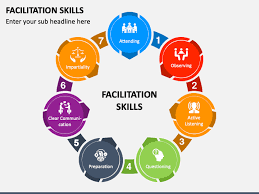
Mastering the Art of Facilitation: Enhancing Collaboration and Productivity
The Art of Facilitation: Enhancing Collaboration and Productivity
Facilitation is a crucial skill that plays a significant role in fostering effective communication, collaboration, and productivity within teams and organizations. Whether in a meeting, workshop, or training session, a skilled facilitator can guide discussions, manage group dynamics, and ensure that objectives are met efficiently.
Key Elements of Facilitation
Effective facilitation involves several key elements that contribute to its success:
- Active Listening: A skilled facilitator listens attentively to participants, ensuring that their perspectives are heard and understood.
- Clarity of Purpose: Setting clear goals and objectives for the session helps focus discussions and activities towards achieving desired outcomes.
- Neutral Stance: Facilitators maintain a neutral stance to encourage open dialogue and prevent bias from influencing the process.
- Group Dynamics Management: Understanding group dynamics and managing conflicts or disruptions is essential for maintaining a productive environment.
- Flexibility: Being adaptable to changing circumstances or unexpected challenges ensures that the facilitator can effectively guide the group towards its goals.
The Benefits of Effective Facilitation
When done well, facilitation offers numerous benefits to individuals and organizations:
- Enhanced Communication: Facilitators help improve communication by encouraging active participation and ensuring that all voices are heard.
- Innovative Thinking: By promoting creative thinking and problem-solving techniques, facilitators can inspire innovative solutions to challenges.
- Better Decision-Making: Facilitated discussions often lead to more informed decisions as participants explore various perspectives and options.
- Increased Engagement: Engaging sessions led by skilled facilitators can boost participant motivation and commitment to shared goals.
- Elevated Productivity: By streamlining discussions and activities towards defined objectives, facilitation helps teams achieve results more efficiently.
Cultivating Facilitation Skills
Becoming an effective facilitator requires practice, experience, and ongoing development of skills. Individuals interested in honing their facilitation abilities can benefit from training programs, workshops, mentoring opportunities, and feedback from peers. By investing in the art of facilitation, individuals can enhance their leadership capabilities and contribute positively to collaborative endeavors within their organizations.
In conclusion, facilitation is a powerful tool for promoting collaboration, communication, and productivity in various settings. Skilled facilitators play a vital role in guiding groups towards shared goals while fostering an environment of trust, creativity, and mutual respect. By embracing the principles of effective facilitation, individuals can unlock the full potential of teamwork and achieve remarkable results together.
Understanding Facilitation: Key Questions and Insights for Effective Group Management
- What is facilitation?
- Why is facilitation important in group settings?
- What are the key skills required to be an effective facilitator?
- How does a facilitator manage group dynamics during discussions?
- What are the common challenges faced by facilitators?
- How can facilitation improve team collaboration and communication?
- What role does active listening play in effective facilitation?
- How can a facilitator ensure that meetings or workshops stay focused on objectives?
- Are there specific training programs available for individuals looking to enhance their facilitation skills?
What is facilitation?
Facilitation is the art of guiding and managing group interactions to achieve specific goals or outcomes effectively. A facilitator acts as a neutral leader who helps create a collaborative environment where participants can engage in open dialogue, share ideas, and work towards common objectives. By leveraging active listening, communication skills, and a structured approach, facilitators enable groups to navigate complex discussions, resolve conflicts, and make informed decisions. Ultimately, facilitation serves as a catalyst for enhancing communication, fostering creativity, and driving productivity within teams and organizations.
Why is facilitation important in group settings?
Facilitation plays a crucial role in group settings for several reasons. Firstly, a skilled facilitator helps ensure that discussions stay focused, productive, and on track towards achieving the desired outcomes. By guiding the conversation and managing group dynamics, facilitators create a structured environment that encourages active participation from all members. Additionally, facilitation promotes inclusivity by giving every individual a voice and ensuring that diverse perspectives are considered. This inclusive approach not only fosters collaboration but also leads to more informed decision-making processes. Overall, facilitation is important in group settings because it enhances communication, encourages engagement, and ultimately helps teams work together more effectively towards common goals.
What are the key skills required to be an effective facilitator?
To be an effective facilitator, several key skills are essential. Active listening is paramount, as it allows facilitators to understand participants’ perspectives and foster open communication. Clarity of purpose is crucial for setting clear objectives and guiding discussions towards desired outcomes. Maintaining a neutral stance helps facilitate unbiased dialogue and decision-making. Proficiency in managing group dynamics enables facilitators to navigate conflicts and maintain a productive environment. Flexibility is also vital, allowing facilitators to adapt to changing circumstances and ensure the smooth progression of sessions. By honing these skills, facilitators can create engaging, collaborative environments that lead to successful outcomes and meaningful interactions.
How does a facilitator manage group dynamics during discussions?
Managing group dynamics during discussions is a critical aspect of effective facilitation. A skilled facilitator employs various strategies to navigate the complexities of group interactions, ensuring that all participants are engaged, respected, and heard. By actively observing nonverbal cues, encouraging balanced participation, addressing conflicts constructively, and guiding the conversation towards the established goals, a facilitator can create a supportive and inclusive environment where diverse perspectives are valued. Through adept communication and interpersonal skills, a facilitator can foster collaboration, maintain focus on the agenda, and ultimately guide the group towards productive outcomes.
What are the common challenges faced by facilitators?
Facilitators often encounter a range of challenges in their role, despite their expertise and experience. Common challenges faced by facilitators include managing diverse group dynamics and personalities, navigating conflicts or disagreements within the group, maintaining participant engagement and motivation throughout sessions, adapting to unexpected changes or disruptions in the agenda, and ensuring that discussions stay focused on achieving the desired outcomes. Additionally, facilitators may struggle with time management issues, balancing the need for thorough discussion with meeting time constraints. Overcoming these challenges requires a combination of effective communication skills, conflict resolution techniques, flexibility, and a deep understanding of group dynamics to create a productive and collaborative environment for all participants.
How can facilitation improve team collaboration and communication?
Facilitation plays a crucial role in enhancing team collaboration and communication by providing a structured framework for productive interactions. A skilled facilitator can create a supportive environment where team members feel encouraged to express their ideas, opinions, and concerns openly. By guiding discussions, managing group dynamics, and ensuring that all voices are heard, facilitation helps foster active listening and mutual understanding among team members. Through effective facilitation, teams can align their goals, clarify expectations, and develop shared strategies more efficiently, leading to improved collaboration, stronger relationships, and enhanced communication within the team.
What role does active listening play in effective facilitation?
Active listening plays a pivotal role in effective facilitation by serving as the foundation for fostering meaningful communication and engagement within a group setting. As facilitators, practicing active listening allows us to demonstrate genuine interest in participants’ perspectives, concerns, and contributions, creating a supportive environment for open dialogue and idea exchange. By actively listening to verbal and nonverbal cues, facilitators can better understand the dynamics of the group, address potential conflicts or misunderstandings proactively, and guide discussions towards productive outcomes. Active listening not only promotes inclusivity and respect among participants but also enhances the facilitator’s ability to facilitate consensus-building and decision-making processes effectively.
How can a facilitator ensure that meetings or workshops stay focused on objectives?
To ensure that meetings or workshops stay focused on objectives, a facilitator can employ several strategies. Firstly, setting clear and specific goals at the beginning of the session helps provide a roadmap for discussions and activities. The facilitator can also establish ground rules to guide participant behavior and maintain focus throughout the meeting. Encouraging active participation, managing time effectively, and redirecting off-topic discussions back to the agenda are essential techniques for keeping the group aligned with the intended objectives. Additionally, periodic reviews of progress and revisiting goals can help reinforce the purpose of the meeting and ensure that participants remain on track towards achieving desired outcomes. By implementing these tactics consistently, a facilitator can help maximize productivity and engagement while ensuring that meetings or workshops stay purposeful and goal-oriented.
Are there specific training programs available for individuals looking to enhance their facilitation skills?
Individuals seeking to enhance their facilitation skills often inquire about the availability of specific training programs tailored to their needs. Many organizations and educational institutions offer comprehensive training programs designed to develop facilitation competencies, ranging from basic principles to advanced techniques. These programs typically cover topics such as active listening, group dynamics management, conflict resolution, and creative problem-solving. By participating in these training programs, individuals can acquire the necessary knowledge and practical tools to become effective facilitators and contribute positively to collaborative environments.


